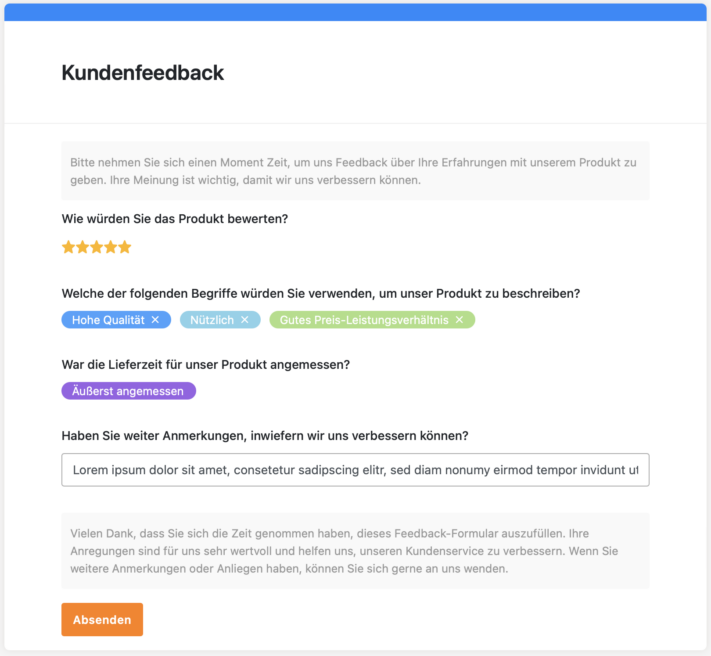What are the advantages of an online survey? #
Knowing the needs and expectations of existing and potential customers is more important than ever for companies today. It is easy to find alternatives online for almost any product or service. Knowing your target group precisely is therefore an invaluable competitive advantage. And the most effective way to achieve this is to ask your (potential) customers directly. Conducting a corresponding survey online offers you a number of advantages:
-
You save a lot of time with an online survey and can simply create a questionnaire digitally instead of making tedious phone calls or approaching passers-by in pedestrian zones.
-
Online surveys are often considerably cheaper than traditional methods. With many tools, an online survey can also be created free of charge.
-
Your reach is significantly greater with an online survey. You can collect representative data from different regions and countries.
-
As soon as you start your survey online, you can track and analyze the responses in real time and no longer have to wait for lengthy manual evaluations.

Create a survey online: Tools in comparison #
Your next customer or employee survey is coming up and now you want to create your online survey, free of charge if possible. We have tested seven survey tools for you based on various criteria, including user-friendliness, customizability, data protection, analysis functions and costs.
Doodle #
If you are looking for an uncomplicated way to plan appointments with several participants, Doodle is a good and popular choice. The application impresses with its user-friendly and minimalist design. Doodle focuses on offering polls for scheduling, but is unsuitable for other polls.
In terms of data protection, the tool is not fully convincing despite SSL encryption. This is because Doodle transfers personal data to foreign servers and uses tracking tools. In addition, it is only possible to hide the list of survey participants in the paid Pro version. The price for this is €6.95 per month.
- Application area: scheduling
- User-friendliness: very good
- Customization options: low
- Data protection: medium
- Analysis function: good
- Costs: partly free of charge
Google Forms #
This tool is ideal for users who want to create a survey online but do not need complex functions. Google Forms is particularly user-friendly thanks to its clear interface and structure. You can use different question types and integrate images and videos. You can also divide questions into clear sections and easily implement both random sequences and branched questions.
In addition, Google Forms meets all the requirements of the GDPR and other global compliance guidelines, which ensures the security of your data.
- Scope of application: surveys and quizzes
- Ease of use: very good
- Customization options: high
- Data protection: good
- Analysis function: ok
- Costs: free of charge
Surveymonkey #
This tool offers extensive functions and many customization options to create even more complex customer surveys. Whether it’s design, question types, branched questions or analysis functions, Surveymonkey offers a wide range of customization options. The clear step-by-step introduction should make it easy for you to set up a survey online. A special highlight is the extensive question database, which serves as a source of inspiration and a template.
In terms of data protection, Surveymonkey meets the requirements of the GDPR and the California Consumer Privacy Act (CCPA). However, the tool is not cheap in comparison. The free basic version only offers very limited functions, while extensions start at €39 per person per month.
- Application area: surveys and quizzes
- User-friendliness: okay
- Customization options: high
- Data protection: good
- Analysis function: ok
- Costs: expensive, partly free

Survio #
Survio offers a user-friendly platform for creating and conducting surveys in various application areas. Thanks to the many templates and question types as well as the option to organize the survey by page, you can easily create a clearly structured questionnaire. The option to hide or show questions based on previous answers is very interesting, albeit for a fee.
In terms of data protection, the tool meets the requirements of the GDPR and offers additional security through encryption with an SSL certificate. Survio also impresses with extensive analysis functions, including viewing individual responses and displaying survey statistics. The basic version is free, while an extension for additional functions costs €25 per month.
- Application area: surveys
- User-friendliness: very good
- Customization options: high
- Data protection: good
- Analysis function: very good
- Costs: moderate, partly free of charge
LamaPoll #
LamaPoll is particularly – but not only – suitable for a wide variety of surveys in the scientific field. A plus point is the variety of options for different question types, individual answer paths, coded answers and analyses. Users should therefore plan some time to familiarize themselves with the possibilities of the tool.
LamaPoll is GDPR-compliant and operates its servers in Germany. It also provides transparent data protection documents for companies. If you use this tool for your online survey, you will have to dig a little deeper into your pocket. The free basic version only allows surveys with a maximum of 50 participants. The paid version starts at €49 per month, but offers extended functions and more options for conducting surveys.
- Application area: surveys
- User-friendliness: fine
- Customization options: high
- Data protection: very good
- Analysis function: good
- Costs: expensive, partly free
Alchemer #
Alchemer, formerly Surveygizmo, is primarily aimed at companies. The many different question types and evaluation options allow detailed market research and customer surveys. However, the many options also make it somewhat more difficult for new users to create their first questionnaire. The very good analysis functions and free support are a plus point.
However, this package also comes at a price. Alchemer does not offer a free basic version but only a 14-day free trial period. Small teams of up to three people pay €55 per month for the cheapest package. Alchemer meets the requirements of the GDPR and CCPA, among others, and is ISO 27001 certified
- Area of application: surveys
- User-friendliness: good
- Customization options: high
- Data protection: good
- Analysis function: very good
- Costs: very expensive
SeaTable #

The web forms of SeaTable allow surveys in which the collected data is automatically saved in a table with a database backend. This makes it easy to correlate the data. You can analyze the results of your survey online with various statistics and create flexible reports in the Universal App and with various graphical plugins . SeaTable also allows data to be exported for further analyses or reports.
Although SeaTable does not have the same range of functions for online surveys as Surveymonkey, for example, it offers many practical applications thanks to its individual customization options and intuitive operation. The ability to collect different types of data and evaluate the results collaboratively in a team makes SeaTable a flexible tool for your online survey and other projects. Another plus is the free customer feedback template , which can be easily customized for any survey type.
In terms of data protection, SeaTable meets all GDPR requirements and offers additional security as the data is stored exclusively in German data centers. In addition to the cloud version, there is even the option to install SeaTable on your own server to retain full data sovereignty.
- Application area: surveys
- User-friendliness: very good
- Customization options: high
- Data protection: very good
- Analysis function: very good
- Costs: free of charge
Conclusion #
When choosing a survey tool, it is important that you know your individual requirements. Google Forms, Surveymonkey, LamaPoll and SeaTable are just a few examples that you can use. There is no universally perfect tool; each has a different price-performance ratio as well as its own advantages and disadvantages.
Overall, online surveys offer a flexible and powerful method for collecting and analyzing data. By choosing the right tool and applying statistical methods, you can effectively gain insights, make decisions and achieve your goals.
FAQ - Conduct a survey online #
What to look out for in an online survey?
What are the 10 commandments of question formulation according to Porst?
In order to achieve good results, it is particularly important that you formulate your questions carefully when creating a survey. Poorly worded questions can lead to inaccurate or biased responses, which can affect the validity of your data. This would be unfortunate, especially if you have invested a lot of time and effort into the survey. To avoid such problems, social scientist Rolf Porst has formulated ten principles that you should definitely consider when creating a questionnaire. Avoid
-
difficult, ambiguous terms
-
long and complex questions
-
double stimuli and negations
-
insinuations and suggestive questions
-
Questions about information that respondents do not have
-
Questions without a clear time reference
-
Answer categories that overlap
-
Questions with influencing context
-
Unclear terms not to be defined
How much does an online survey tool cost?
How do you choose the right tool?
If you want to create customer surveys and launch an online survey for this purpose, it is not so easy to find the right tool that also meets your requirements. There is no general answer to this question. In addition to the question of how much your online survey should cost, there are other factors that you should critically examine in the online survey tools available before you create your questionnaire:
-
How does the tool guarantee data protection and data security?
-
Can surveys be created with different question types?
-
Is the tool easy to use?
-
What design and branding options are available?
-
Does the tool offer flexible reporting and analysis functions?
-
Can external databases be integrated?
TAGS: Tools & Plugins Marketing Planning Customer Relationship Management Data Management & Visualisation
